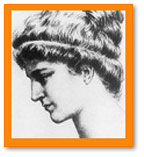Hypatia
(370-415 AD)
Alexandria,
Egypt
 Hypatia
was a Greek who lived in Alexandria, Egypt, the third largest
city of the Roman Empire, and a melting pot of cultures. In a
time when women were considered second class citizens, Hypatia
was a teacher at an all-male school. One of her students later
invented the astrolabe, which measures the position of the stars
and planets. She was an incredibly gifted astronomer.
Hypatia
was a Greek who lived in Alexandria, Egypt, the third largest
city of the Roman Empire, and a melting pot of cultures. In a
time when women were considered second class citizens, Hypatia
was a teacher at an all-male school. One of her students later
invented the astrolabe, which measures the position of the stars
and planets. She was an incredibly gifted astronomer.
Hypatia
believed in a divine being, "the One," which was the ultimate
source of all reality. She wanted to
get closer to "the One" and taught her students to break away
from the world of matter by searching
for the soul, which she called, "the eye buried within us." By
finding the soul, a person could be closer to "the One." Hypatia
helped her students get in touch with their spiritual nature,
or the "eye within".
Hypatia
dressed simply, preferring the white cloak of a philosopher. She
was known to ride around the city of Alexandria in a chariot.
During Hypatia’s lifetime, there was a lot of fighting between
Jews, Christians, and pagans. Because of her great power and belief
in "the One," which was considered pagan, she was dragged from
her chariot by an angry mob and murdered.
Classroom
discussion questions:
If Hypatia were alive today, how would she answer the question,
"Truth or Beauty, which has a greater impact on society?"
In a historical context, what would Hypatia think was the greatest
challenge facing society during her lifetime?
What
does Hypatia's term "eye within" mean to you?
What
did Hypatia mean by "breaking away from the world of matter"?
Can
a person's spiritual nature be used to answer philosophical questions
as well as a logical, reasoning approach?
To
learn more about Hypatia, follow these links:
http://www-groups.dcs.st-andrews.ac.uk/~history/Mathematicians/hypathia.html
http://www.cosmopolis.com/people/hypathia
If you have
suggestions for the Philosopher of the week, please e-mail us
at: info@philosophyslam.org
TO LEARN ABOUT OUR
OTHER "PHILOSOPHERS OF THE WEEK" CLICK ON ONE OF THE
LINKS BELOW.
• Dewey • Socrates • Plato • Confucius • Rand • Aquinas • Locke • Camus • Cavendish • Sartre • Rousseau • King• Descartes • Spinoza • de
Beauvoir • Nietzsche • Kant • Hypatia • Thoreau •

